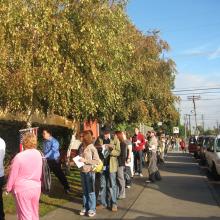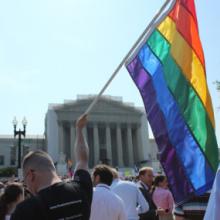Arizona
As many people in the United States prepared for the holiday weekend, the Supreme Court’s conservative 6-3 majority upheld two laws that restrict voting in Arizona. The first law the court upheld disenfranchises voters if they cast a ballot in the wrong precinct, invalidating not just their votes for local races, but also their entire ballot, including votes cast in U.S. presidential elections or Senate races, even though all eligible voters in Arizona can vote in those races regardless of the district where they live. The other law prohibits most people from delivering another voter’s absentee ballot to a polling place, making it a crime for anyone but a family member or caregiver to do so.
The U.S. Supreme Court on Thursday endorsed two Republican-backed ballot restrictions in Arizona that a lower court found had disproportionately burdened Black, Latino and Native American voters, handing a defeat to voting rights advocates and Democrats who had challenged the measures.
The 6-3 ruling, with the court's conservative justices in the majority, held that the restrictions on early ballot collection by third parties and where absentee ballots may be cast did not violate the Voting Rights Act, a landmark 1965 federal law that prohibits racial discrimination in voting.
IN 1974, TWO teenagers went on a vandalism spree in the quiet community of Elmira, Ontario. They slashed car tires, broke store windows, and destroyed a garden gazebo, racking up about $3,000 worth of damage. The pair faced jail time for malicious vandalism. Instead, their parole officer, Mark Yanzi, who was also part of Mennonite Central Committee in Canada, asked the presiding judge if the youths could meet their victims face to face. This, they said, would allow the offenders to apologize directly and pay for damages. The judge agreed—setting legal precedent in Canada.
Though Indigenous and First Nations communities have a long history of similar conflict resolution practices, the Elmira case is seen as a moment when formalized restorative justice models, known at the time as victim-offender reconciliation programs (VORP), entered the Canadian criminal legal system. And Mennonite Christians were integral from the beginning.
In a 1989 handbook, VORP Organizing: A foundation in the church, Ron Claassen, Howard Zehr, and Duane Ruth-Heffelbower further developed the concept of VORP as a program that could work in cooperation with the judicial system but embodied “different assumptions about crime and punishment.”
“True justice requires that things be made right between the one offended and the one who has done the offending. It embodies a concept of restoration—of victim as well as offender. This also implies personal accountability on the part of the offender, who is encouraged to acknowledge his or her responsibility for the harm, participate in deciding what needs to be done, and to take steps to make amends,” they wrote.
The charges come in the wake of the publication of a report by No More Deaths and La Coalición de Derechos Humanos that indicated at least 3,586 gallon jugs of water destroyed in the desert region near Arivaca, Ariz., by U.S. Border Patrol agents between 2012-2015.
“Yes. I saw water bottles stabbed," Miguel, a migrant from Sinaloa, Mexico, said in the report. "They break the bottles so you can’t even use them to fill up at the tanks. I needed water, some of the other people in the group needed water, but we found them destroyed."

Image via Fibonacci Blue/flickr.com
In recent days more than 100 undocumented immigrants have reportedly been detained by U.S. Immigration and Customs Enforcement Agents. Texas Observer reports that as many as five immigrants were detained on Feb. 9. According to the Los Angeles Times, immigration activists claim that about 100 people have been taken into custody by ICE this week, resulting in a protest in downtown Los Angeles. And news of the arrest and deportation of Guadalupe Garcia de Rayos — a mother who was previously convicted for using false papers to gain employment and afterward obeyed an order to report to ICE every six months — have circulated through social media and news outlets.
The United States Congress is about as Christian today as it was in the early 1960s, according to a new analysis by Pew Research Center.
Nearly 91 percent of members of the 115th Congress convening on Jan. 3 describe themselves as Christian, compared to 95 percent of Congress members serving from 1961 to 1962, according to congressional data compiled by CQ Roll Call and analyzed by Pew.

Image via bunnicula / flickr.com
Hillary Clinton’s presidential campaign is joining with the Democratic Party to sue Arizona after the state’s fiasco of a primary election. Some voters in the primary waited up to five hours to vote.

Rosa Robles, bottom right. Image via Church World Service / Flickr
Rosa Robles spent 461 days inside a Tucson, Ariz., church after receiving a deportation order that would have separated her from her husband and children.
She has finally received an assurance from the federal government that she will not be deported, so on Nov. 11, she left the church for the first time in over one year.
State Sen. Sylvia Allen, R-Ariz., wins the top prize for this year’s silliest religious idea so far.
While debating a proposed law that would permit people to carry concealed weapons in public buildings, Allen said, “Probably we should be debating a bill requiring every American to attend a church of their choice on Sunday to see if we can get back to having a moral rebirth.”
Although the senator said it was a “flippant” suggestion, she remained unapologetic for her comments on “the moral erosion of the soul of America.”
Only 15 women have been executed in the U.S. since the reinstatement of the death penalty in 1976. For two death penalty cases involving women to make the news in the same week is unprecedented – but it’s happening.
One is Jodi Arias, convicted of killing her ex-boyfriend in 2008, whose sentencing trial was this week. She could face the death penalty in Arizona.
The other is a lesser-known case in Georgia — Kelly Gissendaner, convicted in a 1997 Atlanta murder plot that targeted her husband. Though sentenced to death, it is clear that with a little better legal coaching, Ms. Gissendaner could have plea-bargained for her life. That’s exactly what her husband’s killer, Gregory Owens, did. And now he’s behind bars as she counts down the hours to her death. It just doesn’t feel like your life should depend on how well you play the legal cards, but it sure seems to.
Kelly Gissendaner was supposed to die Wednesday night — but there was an interruption.
IN OCTOBER 2013, an ad hoc group of humanitarians in Tucson, Ariz., chained themselves under buses scheduled to bring undocumented immigrants to trial at the federal district courthouse. The protests were aimed at Operation Streamline, which requires federal criminal charges to be brought against every person accused of an illegal border crossing. The action halted, for one day, Operation Streamline’s en masse prosecution of groups ranging from 50 to 100 people.
Under Operation Streamline, implemented under the Bush administration, deportation cases shifted from civil immigration authorities to federal criminal courts, a move that forced undocumented immigrants into the federal criminal justice system and into U.S. prisons. Operation Streamline is undergirded by a 2005 Customs and Border Patrol program called the Consequence Delivery System (CDS), which “guides management and agents through a process designed to uniquely evaluate each subject and identify the ideal consequence to break the smuggling cycle.” Using CDS, a first border-crossing offense is treated as a misdemeanor, punishable by up to six months in prison. Those who are caught a second time face deportation and possible felony convictions punishable by up to 20 years in prison.
Prior to CDS, border crossers without proper documentation were rarely prosecuted as criminals; instead, they were “administratively deported” through the civil immigration system. Under fast-track programs such as Operation Streamline, a federal criminal case—with prison and deportation consequences—can be completed in two days or less.
On Sept. 25 Francisco Córdoba entered into Sanctuary at St. Francis in the Foothills United Methodist Church in Tucson, Ariz., after the threat of deportation had been looming over his family's life for eight long months.
It has been an honor for those of us here at St. Francis to receive the blessing of Francisco and his family and to offer them a place where they can begin to see a solution to our broken immigration system. It was even more important that we receive the amazing blessing that they bring to us.
The Supreme Court’s decision to sit out the legal battle over same-sex marriage will — for now, at least — leave the future of laws prohibiting gays and lesbians from marrying in the hands of lower state and federal court judges. But it also almost certainly means the couples challenging those laws are more likely to win in the end.
The court said Oct. 6 that it would not hear appeals from five states whose same-sex marriage bans had been invalidated by lower federal courts. The decision, issued without explanation, will likely lead to recognition of gay marriages in 11 more states. It also allows an avalanche of legal challenges to the remaining bans to keep going forward in state and federal courts, where gay and lesbian couples have overwhelmingly prevailed.
The court’s decision leaves unchanged 20 state laws blocking same-sex unions. Each is already under legal attack, facing challenges in state or federal court, and sometimes both. Challenges to marriage bans already have reached a handful of state appeals courts and the federal appeals courts for the 5th, 6th, 9th and 11th circuits.
Some of those judges had been waiting to see what the Supreme Court would do. The court’s instruction Oct 6. was: Proceed.
America was a free country. There, freedom is everything. Growing up, that was the picture I had. America was the country where you’re free to do whatever you want.
It all changed when I turned 16. I woke up excited, ready to go to the DMV and get my driver’s license like all my friends were doing -- and then my parents told me that I was here illegally. I was undocumented. Reality sunk in. America was not a free country for me.
I have great respect for religion writer Jonathan Merritt, even though we disagree on a lot of social and theological issues. He evoked a maelstrom about his article suggesting the Arizona law allowing businesses to deny service to LGBTQ people was less than Christian, and yet he stands behind his words.
Basically, many prominent voices from the Baptist and Neo-Calvinist camps went berserk about his call for tolerance; never mind that he didn’t even take on the moral issues surrounding LGBTQ identity itself. It was simply enough that he called for equal treatment of all people as fellow human beings, period. But he broke rank with the conservative Christian rank-and-file, which depends heavily on uniformity of voice and position on key issues.
Merritt took a risk, knowing full well that he’d likely suffer for it. And he did. In a small online forum of fellow religion writers, he expressed dismay both at the aggressive, hateful nature of peoples’ response from the right, as well as the relative palpable silence from the center and left.
For that, to the degree that I can speak for myself and others like me, I’m sorry, Jonathan. When someone steps out like this, putting himself at risk, we should rally to support him, as much as those on the right rally behind causes.
Arizona has been in the news because of an attempt to get a law on the books that would give Christian business owners the right to refuse products or services on religious grounds. Many commentators feared it would create a right to discriminate against the LGBTQ community. A robust debate has ensued around the question of whether it is Christian to refuse service for any reason or more Christian to serve everyone without qualification. It’s a good debate and it has revolved around the interpretation of certain Biblical texts – the so-called “clobber texts” and whether they condemn homosexual behavior; the call to be neighborly and love our enemies and whether that includes a bit of tough love now and then. My view was well explained by Benjamin Corey – I’m on the love everyone, no exceptions side of this debate with Ben. To my way of thinking, the law was very un-Christian and I’m glad that Gov. Jan Brewer refused to sign it .
But despite Ben Corey’s eloquence and my agreement with him, we didn’t really settle anything. These verbal jousting matches about whose interpretation of Christianity is more true, important as they are, don’t go deep enough. I’d like to introduce a historical element by looking closely at what religion is and how it has functioned in human history. The question I want to ask is not whether it’s Christian to exclude someone but whether it is religious. I’d like to make the case that the answer is yes, it is religious, and propose that Christianity, and any religion that emphasizes the unity of humanity over our differences, is therefore not a religion like other religions. Christianity is therefore more radical than most of its adherents realize.
“Never in my life has my very faith been called into question like this.”
That’s what young evangelical writer Jonathan Merritt told me this week. His statement followed a media firestorm, ignited when both he and Kirsten Powers, weighed in on proposed laws in Kansas and Arizona that would have allowed business owners to deny service to gay couples, based on conservative religious beliefs about homosexuality. Merritt and Powers each suggested that justifying legal discrimination against gay and lesbian couples might not be the best form of Christian outreach and raised consistency issues of whether discrimination would also be applied to other less than “biblical” marriages, or if just gays and lesbians were being singled out.
Their columns in both the Religion News Service and the Daily Beast have provoked intense responses from many Southern Baptists (where Merritt has his own heritage), those who call themselves Neo or “New” Calvinists, and other assorted critics from the political right.
Neither Merritt nor Powers took clear theological positions on all the sexuality issues involved. But both have been stunned by the responses from emails, tweets, and angry phone calls. The 1,200 Twitter notifications, messages, and calls from “leaders” that Merritt has received in the last few days include, “You only pretend to worship Jesus.” “You’re not a Christian.” “You are the enemies of Christianity.” “You’re marginalized now.” “You’re damaged goods.” “You’re on the outs now.”
Merritt and Powers were not questioning the gospel; they were “just asking whether we should discriminate against a whole group of people.” Both columnists believe Christians can honestly disagree on these complicated questions surrounding sexuality, but wanted to raise a discussion about whether passing laws that discriminate based on one religious point of view was wise, especially in this rapidly changing culture.
My flight home from Phoenix over the weekend got pushed back, so I wound up spending an extra night at an airport hotel. Also, I got an $8 food voucher from the airline. I decided to eat at the hotel.
The restaurant was located on the top floor of the hotel with a nice view of downtown. There was a small bar near the entrance. A handful of hotel visitors were enjoying complimentary drinks and watching the Olympics on a flat-screen television.
I was greeted at the door by Melody, a transplant from Erie, Pa., who doubles as a bartender and a server. When I mentioned that I had a food voucher, she offered condolences for my scrambled travel plans. She also offered me a free beer.
Glass of red ale in hand, I picked a table in a corner of the restaurant, ordered a spinach salad and went back to reading a book about the Rev. Martin Luther King, Jr. and the long struggle to get the country to live up to its ideal that everyone should be treated as an equal child of God.
I couldn’t help but think about my 10 days in Arizona watching the state legislature debate and ultimately pass a bill that would allow business owners and individuals to refuse service to anyone on grounds of religious freedom. The impetus was a New Mexico case involving a photographer who refused to take photos of a gay couple.
The bill was promoted as a religious liberty issue. Opponents pointed out that it was the definition of discrimination — people would be singled out for unequal treatment.
Gay rights are colliding with religious rights in states like Arizona and Kansas as the national debate over gay marriage morphs into a fight over the dividing line between religious liberty and anti-gay discrimination.
More broadly, the fight mirrors the national debate on whether the religious rights of business owners also extend to their for-profit companies. Next month, the U.S. Supreme Court will decide whether companies like Hobby Lobby must provide contraceptive services that their owners consider immoral.
The Arizona bill, which is headed to Gov. Jan Brewer’s desk for her signature, would allow people who object to same-sex marriage to use their religious beliefs as a defense in a discrimination lawsuit.
North Carolina lawmakers on Wednesday approved a bill to prohibit judges from considering “foreign laws” in their decisions, but nearly everyone agrees that “foreign laws” really means Shariah, or Islamic law.
North Carolina now joins six other states — Oklahoma, Arizona, Kansas, Louisiana, South Dakota, and Tennessee — to pass a “foreign laws” bill. A similar bill passed in Missouri, but Gov. Jay Nixon vetoed it, citing threats to international adoptions.
The bills all cite “foreign laws” because two federal courts have ruled that singling out Shariah — as Oklahoma voters originally did in 2010 — is unconstitutional.
















